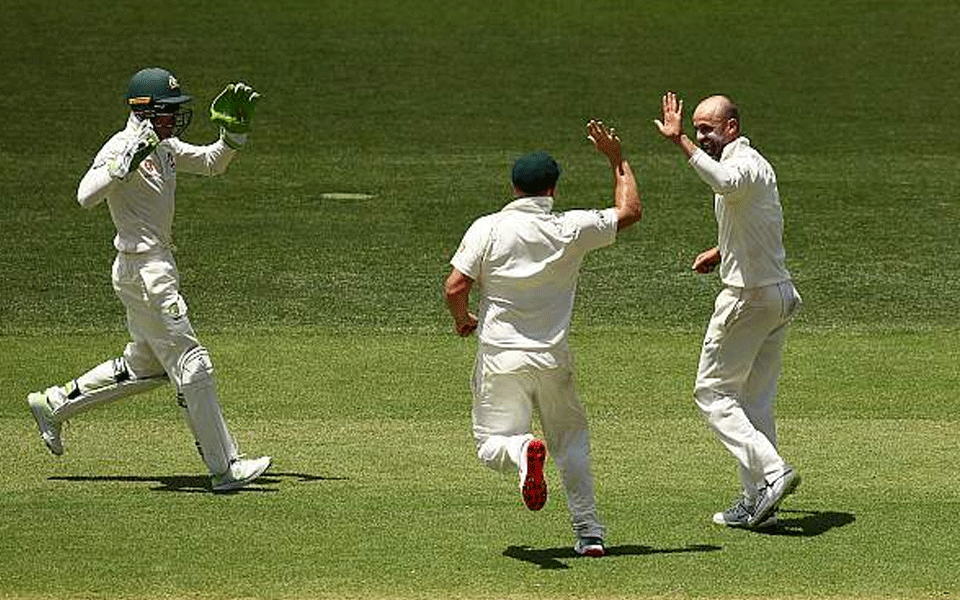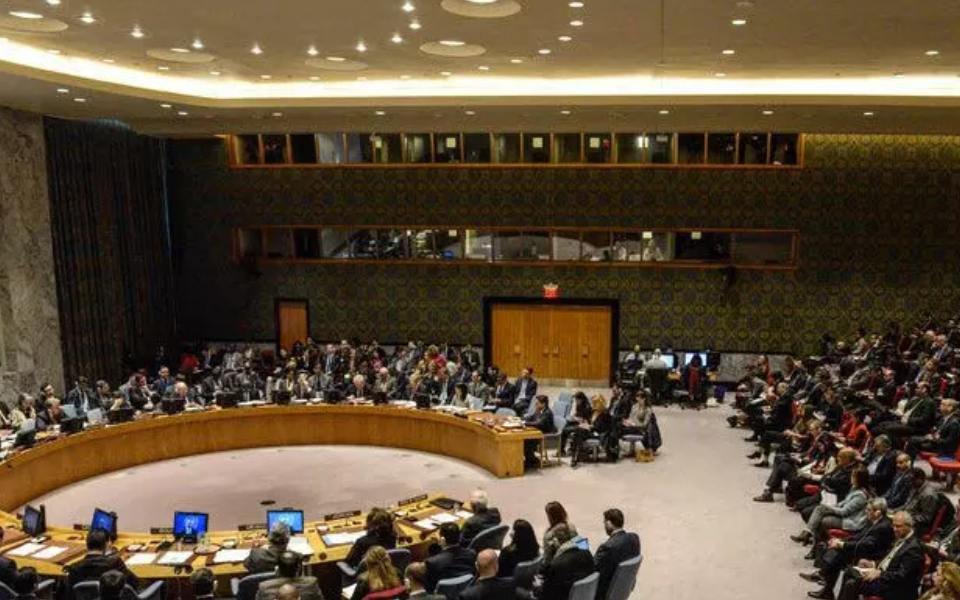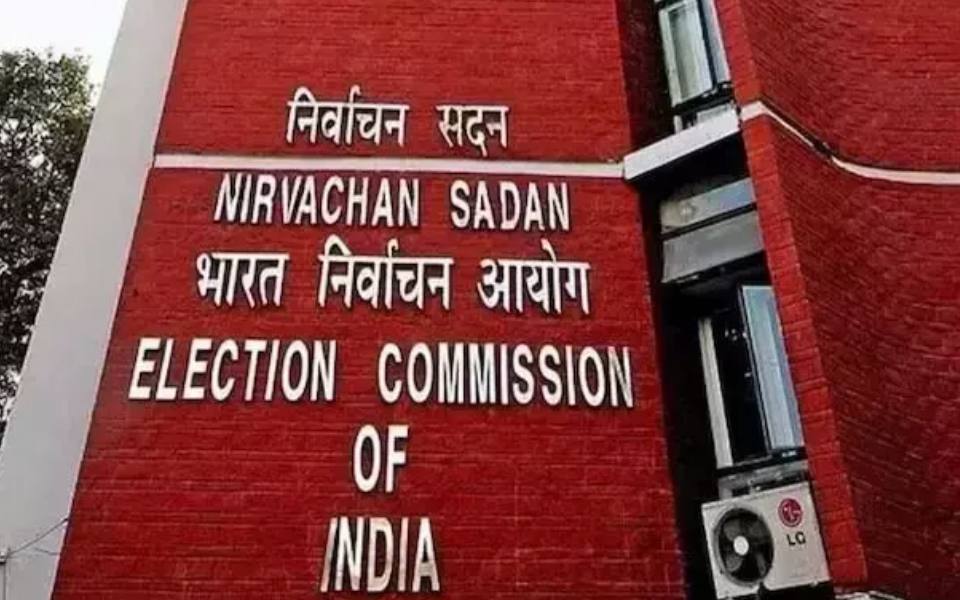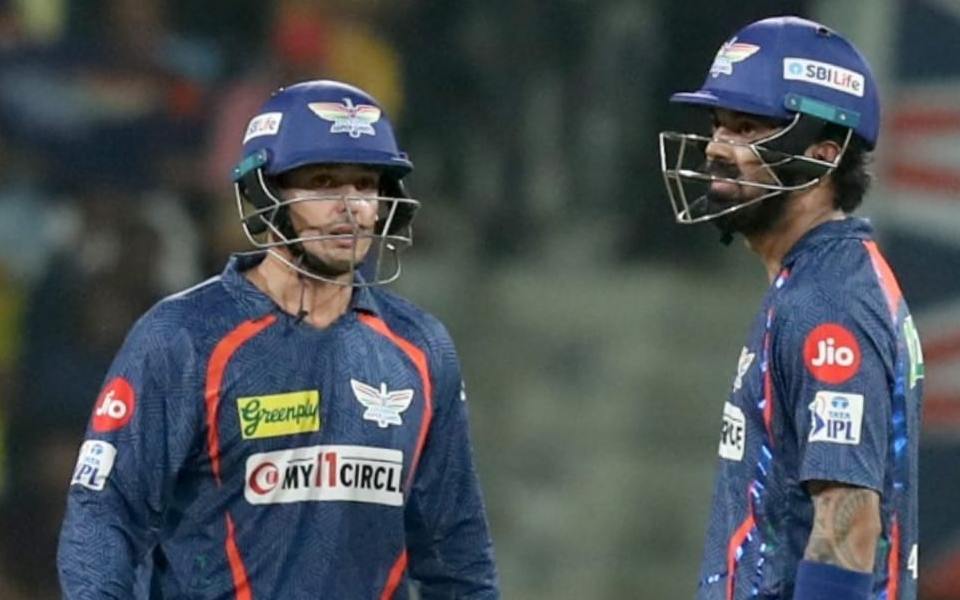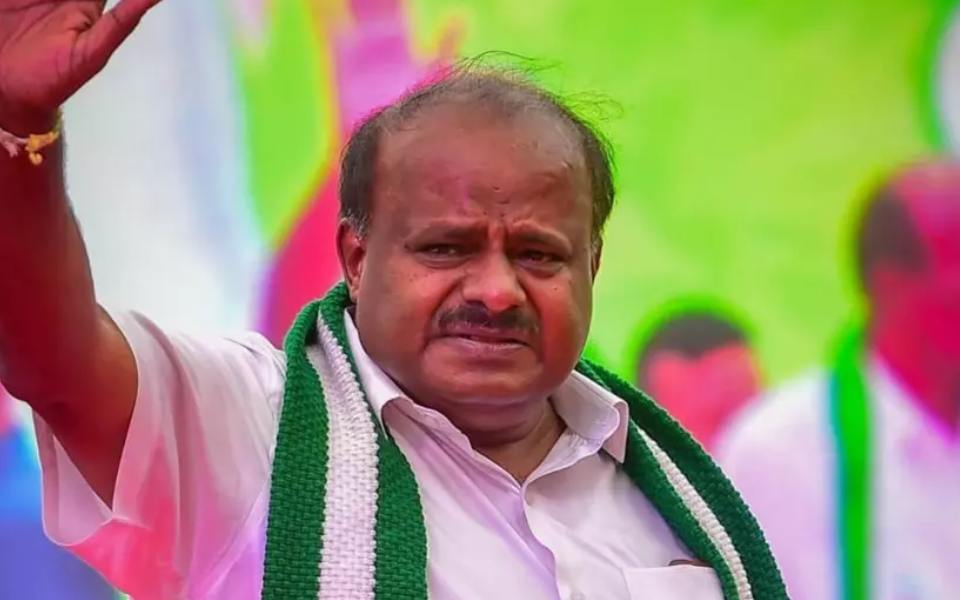Adelaide, Dec 6: Cheteshwar Pujara's gritty innings was the sole silver lining in yet another ordinary batting display which reduced India to 143 for six at tea on day one of the first Test against Australia here on Thursday.
At the break, Pujara was unbeaten on 46, having faced 141 deliveries, while R Ashwin was batting on 5 not out after the session lasting 29 overs. This was after a horrendous shot selection by Rohit Sharma (37) had left India in the lurch at 86 for five in the 38th over.
Post lunch, Rohit and Pujara started off well as they added 45 runs for the fifth wicket.
While Pujara was sedate at one end, the former took the lead in scoring as he hit sixes at will. Two came off Pat Cummins (1-31); the first a pull shot that sailed for six and the other a proper cover drive that cleared the ropes comfortably.
It seemed that Rohit was intent on digging India out of this hole as he hit Nathan Lyon (2-51) for a six on the second ball of the 38th over. Marcus Harris almost caught it, with the ball barely crossing over the ropes and the umpire took some time to call it a six.
That should have been a note of caution for the batsman, but he didn't heed it and skied the very next ball for Harris to take an easy catch in the deep this time.
Rishabh Pant (25) too arrived at the crease with intent of attacking the bowling. He scored two fours and a six in the space of a few deliveries, before Pujara asked him to calm down.
The duo then added 41 runs for the sixth wicket as India crossed 100 in the 41st over, including five sixes surprisingly.
Pant didn't look comfortable though as he was forced to play against his natural game. And it showed when he edged Lyon behind to be dismissed shortly before tea.
Earlier, Josh Hazlewood (2-28) reduced India to 56 for four at lunch. The Australian pacers struck regularly with the new Kookaburra ball and made inroads into the Indian top-order that never got going.
This was after India won the toss and opted to bat on a warm Adelaide day. Hanuma Vihari was left out as the visitors drafted in Rohit for the number six spot. For Australia, Marcus Harris made his Test debut as announced a day prior.
Mitchell Starc (1-30) and Hazelwood began proceedings for Australia, and were on the money straight away with their lengths.
Of the two Indian openers, KL Rahul (2) looked out of sorts against their express pace, and was unsurprisingly dismissed cheaply. He went for an extravagant drive in only the second over and was caught at third slip off Hazlewood.
Murali Vijay (11) looked intent on getting a better start and he was watchful. On a couple occasions, he drove the ball to get the score moving but ultimately this led to his dismissal. In the seventh over, Vijay went for a cover drive against Starc and only ended up edging behind.
Given the conditions, Kohli then walked out to bat a lot earlier than anticipated. He looked a lot more confident, but an awe-inducing diving catch ended his short stay at the crease.
Usman Khawaja dove to his left and held a stunning one-handed catch at gully off Cummins as Kohli was sent back with India reeling at 19-3 in 11 overs.
Pujara and Ajinkya Rahane (13) then came together for the fourth wicket, trying to put on a semblance of a partnership. Together they faced 59 balls and put on 22 runs in a bid to keep the scoreboard ticking.
Rahane had some difficulty against Lyon who came on to bowl immediately after the drinks' break. The batsman then stepped out to even hit Lyon for a six over long on in his second over.
But this didn't work against the pacers, who pushed Indian batsmen back with their perfect length and induced drives thereafter. In the 21st over then, Rahane fell to Hazelwood, the fourth batsman out driving in this morning session, and was caught at second slip.
Brief Score: IND 183/6 (71 Overs)
Let the Truth be known. If you read VB and like VB, please be a VB Supporter and Help us deliver the Truth to one and all.
United Nations, Apr 19: The US has vetoed a resolution in the UN Security Council on the latest Palestinian bid to be granted full membership of the United Nations, an outcome lauded by Israel but criticised by Palestine as “unfair, immoral, and unjustified".
The 15-nation Council voted on a draft resolution Thursday that would have recommended to the 193-member UN General Assembly “that the State of Palestine be admitted to membership in the United Nations.”
The resolution got 12 votes in its favour, with Switzerland and the UK abstaining and the US casting its veto.
To be adopted, the draft resolution required at least nine Council members voting in its favour, with no vetoes by any of its five permanent members - China, France, Russia, the United Kingdom and the United States.
Palestinian attempts for recognition as a full member state began in 2011. Palestine is currently a non-member observer state, a status that was granted in November 2012 by the UN General Assembly.
This status allows Palestine to participate in proceedings of the world body but it cannot vote on resolutions. The only other non-member Observer State at the UN is the Holy See, representing the Vatican.
Israel’s Foreign Minister Israel Katz praised the US for vetoing what he called a “shameful proposal.”
“The proposal to recognise a Palestinian state, more than 6 months after the largest massacre of Jews since the Holocaust and after the sexual crimes and other atrocities committed by Hamas terrorists was a reward for terrorism”, Katz wrote on X, after the US veto.
US Ambassador Robert Wood, Alternative Representative for Special Political Affairs, said in the explanation of the vote at the Security Council meeting on Palestinian membership that Washington continues to strongly support a two-state solution.
“It remains the US view that the most expeditious path toward statehood for the Palestinian people is through direct negotiations between Israel and the Palestinian Authority with the support of the United States and other partners,” he said.
“This vote does not reflect opposition to Palestinian statehood, but instead is an acknowledgement that it will only come from direct negotiations between the parties.”
Wood said there are “unresolved questions” as to whether Palestine meets the criteria to be considered a State.
“We have long called on the Palestinian Authority to undertake necessary reforms to help establish the attributes of readiness for statehood and note that Hamas - a terrorist organisation - is currently exerting power and influence in Gaza, an integral part of the state envisioned in this resolution,” he said, adding that “For these reasons, the United States voted “no” on this Security Council resolution.”
Wood noted that since the October 7 attacks last year against Israel by Hamas, US President Joe Biden has been clear that sustainable peace in the region can only be achieved through a two-state solution, with Israel’s security guaranteed.
"There is no other path that guarantees Israel’s security and future as a democratic Jewish state. There is no other path that guarantees Palestinians can live in peace and with dignity in a state of their own. And there is no other path that leads to regional integration between Israel and all its Arab neighbours, including Saudi Arabia,” he said.
The Palestinian Authority President, Mahmoud Abbas, sharply criticised the US veto, saying that it was “unfair, immoral, and unjustified, and defies the will of the international community, which strongly supports the State of Palestine obtaining full membership in the United Nations.”
Riyad Mansour, Permanent Observer of the State of Palestine, said that “our right to self-determination has never once been subject to bargaining or negotiation.
“Our right to self-determination is a natural right, a historic right, a legal right. A right to live in our homeland Palestine as an independent state that is free and that is sovereign. Our right to self-determination is inalienable...,” he said.
Getting emotional and choking up as he made the remarks, Mansour said that a majority of the Council members “have risen to the level of this historic moment” and have stood “on the side of justice, freedom and hope.”
He asserted that Palestine’s admission as a full member of the UN is an “investment in peace.”
On April 2, 2024, Palestine again sent a letter to UN Secretary-General Antonio Guterres requesting that its application for full UN membership be considered again.
For a State to be granted full UN membership, its application must be approved both by the Security Council and the General Assembly, where a two-thirds majority of the members present and voting is required for the State to be admitted as a full member.
Earlier in the day, Guterres, in his remarks to a Council meeting on the Middle East, warned that the region is on a “knife edge”.
“Recent escalations make it even more important to support good-faith efforts to find lasting peace between Israel and a fully independent, viable and sovereign Palestinian state,” Guterres said.
“Failure to make progress towards a two-state solution will only increase volatility and risk for hundreds of millions of people across the region, who will continue to live under the constant threat of violence,” he said.
The UN, citing the Ministry of Health in Gaza, said that between October 7 last year and April 17, at least 33,899 Palestinians have been killed in Gaza and 76,664 Palestinians injured. Over 1,200 Israelis and foreign nationals, including 33 children, have been killed in Israel, the vast majority on October 7.
As of April 17, Israeli authorities estimate that 133 Israelis and foreign nationals remain captive in Gaza, including fatalities whose bodies are withheld.

